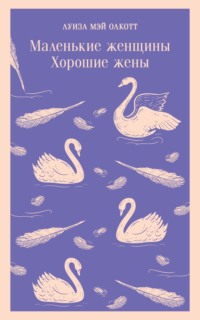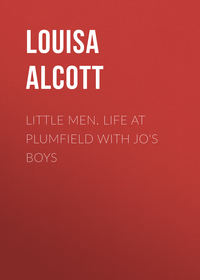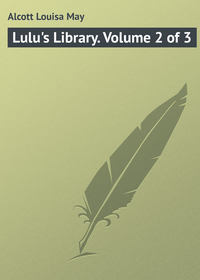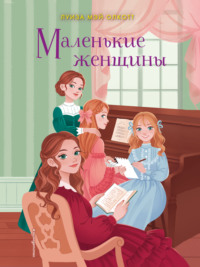 полная версия
полная версияLulu's Library. Volume 3 of 3
"Tell me yours, and I 'll tell mine," said Di, teasingly.
"I will not! You have no right to touch my gifts, and I am sure you have done it, else how know you who sends this fine cadeau?" cried Sophie, with the flash Di liked to see.
Here Fanny interposed, "If you have any note or card belonging to Sophie, give it up at once. She shall not be tormented. Out with it, Di. I see your hand in your pocket, and I 'm sure you have been in mischief."
"Take your old letter, then. I know what's in it; and if I can't keep my secret for fun, Sophie shall not have hers. That Tilly sent the coral, and Sophie spent her hundred dollars in books and clothes for that queer girl, who'd better stay among her lobsters than try to be a lady," cried Di, bent on telling all she knew, while Sophie was reading her letter eagerly.
"Is it true?" asked Dora, for the four girls were in a corner together, and the rest of the company busy pulling crackers.
"Just like her! I thought it was that; but she would n't tell. Tell us now, Sophie, for Ithink it was truly sweet and beautiful to help that poor girl, and let us say hard things of you," cried Fanny, as her friend looked up with a face and a heart too full of happiness to help overflowing into words.
"Yes; I will tell you now. It was foolish, perhaps; but I did not want to be praised, and I loved to help that good Tilly. You know she worked all summer and made a little sum. So glad, so proud she was, and planned to study that she might go to school this winter. Well, in October the uncle fell very ill, and Tilly gave all her money for the doctors. The uncle had been kind to her, she did not forget; she was glad to help, and told no one but me. Then I said, 'What better can I do with my father's gift than give it to the dear creature, and let her lose no time?' I do it; she will not at first, but I write and say, 'It must be,' and she submits. She is made neat with some little dresses, and she goes at last, to be so happy and do so well that I am proud of her. Is not that better than fine toilets and rich gifts to those who need nothing? Truly, yes! yet I confess it cost me pain to give up my plans for Christmas, and to seem selfish or ungrateful. Forgive me that."
"Yes, indeed, you dear generous thing!" cried Fan and Dora, touched by the truth.
"But how came Tilly to send you such a splendid present?" asked Di. "Should n't think you 'd like her to spend your money in such things."
"She did not. A sea-captain, a friend of the uncle, gave her these lovely ornaments, and she sends them to me with a letter that is more precious than all the coral in the sea. I cannot read it; but of all my gifts this is the dearest and the best!"
Sophie had spoken eagerly, and her face, her voice, her gestures, made the little story eloquent; but with the last words she clasped the letter to her bosom as if it well repaid her for all the sacrifices she had made. They might seem small to others, but she was sensitive and proud, anxious to be loved in the strange country, and fond of giving, so it cost her many tears to seem mean and thoughtless, to go poorly dressed, and be thought hardly of by those she wished to please. She did not like to tell of her own generosity, because it seemed like boasting; and she was not sure that it had been wise to give so much. Therefore, she waited to see if Tilly was worthy of the trust reposed in her; and she now found a balm for many wounds in the loving letter that came with the beautiful and unexpected gift.
Di listened with hot cheeks, and when Sophie paused, she whispered regretfully, -
"Forgive me, I was wrong! I 'll keep your gift all my life to remember you by, for you are the best and dearest girl I know."
Then with a hasty kiss she ran away, carrying with great care the white shell on which Sophie had painted a dainty little picture of the mermaids waiting for the pretty boat that brought good fortune to poor Tilly, and this lesson to those who were hereafter her faithful friends.
VIII
DOLLY'S BEDSTEAD
"Aunt Pen, where is Ariadne to sleep, please? I wanted to bring her cradle, but mamma said it would take up so much room I could not."
And Alice looked about her for a resting-place for her dolly as anxiously as if Ariadne had been a live baby.
"Can't she lie on the sofa?" asked Aunt Pen, with that sad want of interest in such important matters which grown-up people so often show.
"No, indeed! Some one would sit down on her, of course; and I won't have my darling smashed. You would n't like it yourself, aunty, and I 'm surprised at your proposing such a thing!" cried Alice, clasping her babe with a face full of maternal indignation.
"I beg your pardon! I really forgot that danger. I 'm not so used to infants as you are, and that accounts for it. Now I think of it, there's a little bedstead up garret, and you can have that. You will find it done up in a paper in the great blue chest where all our old toys are kept."
Appeased by Aunt Pen's apology, Alice trotted to the attic, found the bedstead, and came trotting back with a disappointed look on her face.
"It is such a funny, old-fashioned thing I don't know that Ariadne will consent to lie in it. Anyway, I must air the feather-bed and pillows first, or she will get cold. I wish I could wash the sheets too, they are so yellow; but there is no time now," said the little girl, bustling round as she spoke, and laying the little bed-furniture out on the rug.
"I guess you used to be fond of it when you were a little girl; and that's why you keep it so nicely now, isn't it?" asked Alice, as she dusted the carved posts and patted the canvas sacking.
"Yes, there's quite a little romance about that bed; and I love it so that I never can give it away, but keep it mended up and in order for the sake of old times and poor Val," said Aunt Pen, smiling and sighing in the same breath.
"Oh, tell about it! I do like to hear stories, and so does Ariadne!" cried Alice, hastily opening dolly's eyes, that she might express her interest in the only way permitted her.
"Well, dear, I 'll tell you this true tale of long ago; and while you listen you can be making a new blanket for the bed. Mrs. Mouse nibbled holes in the other one, and her babies made a mess of it, so I burned it up. Here is a nice little square of flannel, and there are blue, red, and green worsteds for you to work round the edges with."
"Now that is just splendid! I love to work with crewels, and I 'll put little quirls and things in the corners. I can do it all myself, so tell away, please, aunty." And Alice settled herself with great satisfaction, while Ariadne sat bolt upright in her own armchair and stared at Aunt Pen in a way that would have been very embarrassing if her round blue eyes had had a particle of expression in them.
"When I was about ten years old, it was the joy of my heart to go every Saturday afternoon to see my nurse, Betsey Brown. She no longer lived out, but was married to a pilot, and had a home of her own down in what we used to call 'the watery part' of the city. A funny little house, so close to the wharves that when one looked out there were masts going to and fro over the house-tops, and from the upper windows I could see the blue ocean.
"Betsey had a boy with club feet, and a brother who was deformed; but Bobby was my pet playmate, and Valentine my best friend. My chief pleasure was in seeing him work at his turning-lathe, for he was very ingenious, and made all sorts of useful and pretty things.
"But the best thing he did was to cure the lame feet of his little nephew. In those days there were few doctors who attended to such troubles, and they were very expensive; so poor Bobby had gone hobbling about ever since he was born with his little feet turned in.
"Uncle Val could sympathize with him; and though he knew there was no cure for his own crooked back, he did his best to help the boy. He made a very simple apparatus for straightening the crippled feet (just two wooden splints, with wooden screws to loosen or tighten the pressure), and with patience, hope, and faith, he worked over the child till the feet were right, and Bobby could run and play like other children."
"Oh, Aunt Pen, was n't that lovely? And did he really do it all himself? How clever he must have been!" cried Alice, puckering the new blanket in the pleasant interest of the moment.
"He was very clever for a lad of eighteen. But that was not all he did. Bobby's cure was a long one, and I only saw the happy end of it; yet I remember how we all rejoiced, and how proud Betsey was of her brother. My father wrote an account of it for some medical journal, and it was much talked about in our little circle; so much, indeed, that an aunt of ours who had a lame boy came to see Val and talked it all over with him.
"Val was much pleased, and offered to try and cure her son if she would let the boy come and live with him; for it needed great skill and constant care to work the screws just right, and tend the poor little feet gently.
"Aunt Dolly said no at once to that plan; for how could she let her precious boy go and live in that little house down in the poor part of the city?
"There was no other way, however, for Val would not leave his sister and his beloved lathe, and was wise enough to see how impossible it would be to have his own way with the child in a house where every one obeyed his whims and petted him, as such afflicted children usually are petted.
"So Val stood firm, and for a time nothing was done.
"I was much interested in the affair, and every time I saw my cousin Gus I told him what nice times I had down there; how strong and lively Bobby was, and declared my firm belief that Val could cure every disease under the sun.
"These glowing accounts made Gus want to go, and when he set his heart on anything he always got it; so in the end Aunt Dolly consented, and Gus went to board in the little house, much to the wonder of some folks.
"The plan succeeded capitally, however, and Gus thrived like a dandelion in springtime; for simple food, plenty of air, no foolish indulgence, and the most faithful care, built up the little lad in a way that astonished and delighted us all.
"The feet improved slowly; and Val was sure that in time they would be all right, for everything helped on the good work.
"Dear me, what happy days I used to spend at Betsey's! Sometimes Isaac, the jolly, bluff pilot, would take us out in his boat; and then what rosy cheeks and good appetites we got! Sometimes we played in Val's shop, and watched him make pretty things or helped him in some easy job, for he liked to have us near him. And, oh, my heart, what delicious suppers Betsey used to get us in the front room, where all sorts of queer sea treasures were collected, – shells, coral, and seaweed; odd pictures of ships and fish, and old books full of sailor songs and thrilling tales of wrecks."
"I wish I had been there!" interrupted Alice. "Is the house all gone, aunty?"
"All gone, dear, and every one of that merry party but myself," answered Aunt Pen, with a sigh.
"Don't think about the sad part of it, but go on and tell about the bed, please," said Alice, feeling that it was about time this interesting piece of furniture appeared in the story.
"Well, that was made to comfort me when Gus went home, as he did after staying two years. Yes, he went home with straight feet, the heartiest, happiest little lad I ever saw.
"I was heart-broken at losing my playmate, and mourned for him as bitterly as a child could, till Val comforted me, not only by the cunning bedstead for my doll, but by a hundred kindly words and acts, for which I never thanked him half enough.
"Aunt Dolly and my father were so grateful and pleased at Val's success with Gus that they helped him in a plan he had some years later, when he took a larger house in a better place, and with Betsey as nurse, opened a small hospital for the cure of deformed feet. It was an excellent plan; and all was going well, when poor Val wasted rapidly away, and died just as his work began to bring him money and some honor."
"That was very bad! But what became of Bobby and Gus?" asked Alice, who was not of an age to care much about the "sad part" of any story.
"Bob became a sea-captain, and was an excellent fellow till he went down with his ship in a storm after rescuing all his crew, even to the cabin-boy. I'm proud of Bob, and keep those two great pearly shells in memory of him, for he brought them to me after his first voyage."
Aunt Pen's eyes lit up, and her voice rose as she spoke with real pride and affection of honest Captain Brown, who to her was always little Bob.
"I like that, it was so brave and good; but I do wish he had been saved, for then I could have seen him. And maybe he would have brought me a big green parrot that could say funny things. What became of Gus?" asked Alice, after a moment spent in the delightful thought of owning a green parrot with a red tail.
"Ah, my dear, I wish I knew!" exclaimed Aunt Pen, so earnestly that Alice dropped her work, astonished at the change in that usually quiet face.
"Don't tell any more if you 'd rather not," said the little girl, feeling instinctively that she had touched some tender string.
But Aunt Pen only stroked her curly head and went on in a softer tone, with her eyes fixed upon a faded picture that had hung over her work-table ever since Alice could remember.
"I like to tell you, dear, because I want you to love the memory of this old friend of mine. Gus went to sea also, much against his mother's will, for the years spent in the little house near the wharf had given the boy a taste for salt water, and he could not overcome it, though he tried.
"He sailed with Captain Bob all round the world, and would have been with him on that last voyage if a sudden whim had not kept him ashore. More than this we don't know; and for seven years have had no tidings of him. The others give him up, feeling sure that he was lost in the wild hill-country of India, whither he went in search of adventures. I suppose they are right; but I cannot make it true, and still hope to see the dear boy back, or at least to hear some news of him."
"Would n't he be rather an old boy now, Aunt Pen?" asked Alice, softly; for she wanted to chase away the load of pain with a smile if she could.
"Bless my heart, so he would! Forty, at least. Well, well, he never will seem old to me, though his hair should be gray when he comes home." And Aunt Pen did smile as her eyes went back to the faded picture with a tender look that made Alice say timidly, while she laid her blooming cheek against her aunt's hand, -
"Would you mind if I asked if it was Gus who gave you this pretty ring, and was your sweetheart once? Mamma told me you had one, and he was dead; so I must never ask why you did n't marry as she did."
"Yes, he gave me this, and was to come back in a year or two; but I have never seen him since, and never shall, I fear, till we all meet over the great sea at last."
There Aunt Pen broke down, and spreading her hands before her face, sat so still that Alice feared to stir.
Even her careless child's heart was full of pity now; and two great tears rolled down upon the little blanket, to lie sparkling like drops of dew in the heart of the very remarkable red rose she was working in the middle.
Then it was that Ariadne distinguished herself, and proved beyond a doubt that her blue china eyes were worth something. A large, brown, breezy-looking man had been peeping in from the door for several moments, and listening in the most improper manner. No one saw him but Ariadne, and how could she warn the others, poor thing, when she had n't a tongue in her head? Don't tell me that dolls have n't hearts somewhere in their sawdust bosoms! I know better; and I am firmly convinced that Ariadne's was full of sympathy for Aunt Pen; else why should she, a well-bred doll, suddenly and without the least apparent cause, slip out of her chair and fall upon her china nose with a loud whack?
Alice jumped up to catch her darling, and Aunt Pen lifted her head to see what was the matter, and the big brown man, giving his hat a toss, came into the room like a whirlwind!
Alice, Ariadne, bedstead, and blanket, were suddenly swept into a corner by some mysterious means, and lay there in a heap, while the two grown people fell into each other's arms, exclaiming, -
"Pen!"
"Gus!"
I don't know which stared the hardest at this dreadful proceeding, Alice or Ariadne, but I do know that every one was very happy afterward, and that the precious little bedstead was not smashed, for I have seen it with my own eyes.
IX
TRUDEL'S SIEGE
"Grandmother, what is this curious picture about?" said little Gertrude, or "Trudel," as they called her, looking up from the red book that lay on her knee, one Sunday morning, when she and the grandmother sat sadly together in the neat kitchen; for the father was very ill, and the poor mother seldom left him.
The old woman put on her round spectacles, which made her look as wise as an owl, and turned to answer the child, who had been as quiet as a mouse for a long time, looking at the strange pictures in the ancient book.
"Ah, my dear, that tells about a very famous and glorious thing that happened long ago at the siege of Leyden. You can read it for yourself some day."
"Please tell me now. Why are the houses half under water, and ships sailing among them, and people leaning over the walls of the city? And why is that boy waving his hands on the tower, where the men are running away in a great smoke?" asked Trudel, too curious to wait till she could read the long hard words on the yellow pages.
"Did little girls really eat their pussies? Oh, I 'd die before I would kill my dear Jan," cried Trudel, hugging the pretty kitten that purred in her lap.
"Yes, the children ate their pets. And so would you if it would save your father or mother from starving. We know what hunger is; but we won't eat Jan yet."
The old woman sighed as she glanced from the empty table to the hearth where no fire burned.
"Did help come in the ships?" asked the child, bending her face over the book to hide the tears that filled her eyes, for she was very hungry, and had had only a crust for breakfast.
"Our good Prince of Orange was trying to help them; but the Spaniards were all around the city and he had not men enough to fight them by land, so he sent carrier-doves with letters to tell the people that he was going to cut through the great dikes that kept the sea out, and let the water flow over the country so as to drive the enemy from his camp, for the city stood upon high ground, and would be safe. Then the ships, with food, could sail over the drowned land and save the brave people."
"Oh, I 'm glad! I 'm glad! These are the bad Spaniards running away, and these are poor people stretching out their hands for the bread. But what is the boy doing, in the funny tower where the wall has tumbled down?" cried Trudel, much excited.
"The smoke of burning houses rose between the city and the port so the people could not see that the Spaniards had run away; and they were afraid the ships could not get safely by. But a boy who was scrambling about as boys always are wherever there is danger, fire, and fighting, saw the enemy go, and ran to the deserted tower to shout and beckon to the ships to come on at once, – for the wind had changed and soon the tide would flow back and leave them stranded."
"Nice boy! I wish I had been there to see him and help the poor people," said Trudel, patting the funny little figure sticking out of the pepper-pot tower like a jack-in-the-box.
"If children keep their wits about them and are brave, they can always help in some way, my dear. We don't have such dreadful wars now; but the dear God knows we have troubles enough, and need all our courage and faith to be patient in times like these;" and the grandmother folded her thin hands with another sigh, as she thought of her poor son dying for want of a few comforts, after working long and faithfully for a hard master who never came to offer any help, though a very rich man.
"Did they eat the carrier-doves?" asked Trudel, still intent on the story.
"No, child; they fed and cared for them while they lived, and when they died, stuffed and set them up in the Staat Haus, so grateful were the brave burghers for the good news the dear birds brought."
"That is the best part of all. I like that story very much!" And Trudel turned the pages to find another, little dreaming what a carrier-dove she herself was soon to become.
Poor Hans Dort and his family were nearly as distressed as the besieged people of Leyden, for poverty stood at the door, hunger and sickness were within, and no ship was anywhere seen coming to bring help. The father, who was a linen-weaver, could no longer work in the great factory; the mother, who was a lace-maker, had to leave her work to nurse him; and the old woman could earn only a trifle by her knitting, being lame and feeble. Little Trudel did what she could, – sold the stockings to get bread and medicine, picked up wood for the fire, gathered herbs for the poor soup, and ran errands for the market-women, who paid her with unsalable fruit, withered vegetables, and now and then a bit of meat.
But market-day came but once a week; and it was very hard to find food for the hungry mouths meantime. The Dorts were too proud to beg, so they suffered in silence, praying that help would come before it was too late to save the sick and old.
No other picture in the quaint book interested Trudel so much as that of the siege of Leyden; and she went back to it, thinking over the story till hunger made her look about for something to eat as eagerly as the poor starving burghers.
"Here, child, is a good crust. It is too hard for me. I kept it for you; it's the last except that bit for your mother," said the old woman, pulling a dry crust from her jacket with a smile; for though starving herself, the brave old soul thought only of her darling.
Trudel's little white teeth gnawed savagely at the hard bread, and Jan ate the crumbs as if he too needed food. As she saw him purring about her feet, there came into the child's head a sudden idea, born of the brave story and of the cares that made her old before her time.
"Poor Jan gets thinner and thinner every day. If we are to eat him, we must do it soon, or he will not be worth cooking," she said with a curious look on the face that used to be so round and rosy, and now was white, thin, and anxious.
"Bless the child! we won't eat the poor beast! but it would be kind to give him away to some one who could feed him well. Go now, dear, and get a jug of fresh water. The father will need it, and so will you, for that crust is a dry dinner for my darling."
As she spoke, the old woman held the little girl close for a minute; and Trudel clung to her silently, finding the help she needed for her sacrifice in the love and the example grandma gave her.
Then she ran away, with the brown jug in one hand, the pretty kitten on her arm, and courage in her little heart. It was a poor neighborhood where the weavers and lace-makers lived; but nearly every one had a good dinner on Sunday, and on her way to the fountain Trudel saw many well-spread tables, smelled the good soup in many kettles, and looked enviously at the plump children sitting quietly on the doorsteps in round caps and wooden shoes, waiting to be called in to eat of the big loaves, the brown sausages, and the cabbage-soup smoking on the hearth.
When she came to the baker's house, her heart began to beat; and she hugged Jan so close it was well he was thin, or he would have mewed under the tender farewell squeezes his little mistress gave him. With a timid hand Trudel knocked, and then went in to find Vrow Hertz and her five boys and girls at table, with good roast meat and bread and cheese and beer before them.
"Oh, the dear cat! the pretty cat! Let me pat him! Hear him mew, and see his soft white coat," cried the children, before Trudel could speak, for they admired the snow-white kitten very much, and had often begged for it.
Trudel had made up her mind to give up to them at last her one treasure; but she wished to be paid for it, and was bound to tell her plan. Jan helped her, for smelling the meat, he leaped from her arms to the table and began to gnaw a bone on Dirck's plate, which so amused the young people that they did not hear Trudel say to their mother in a low voice, with red cheeks and beseeching eyes, -









